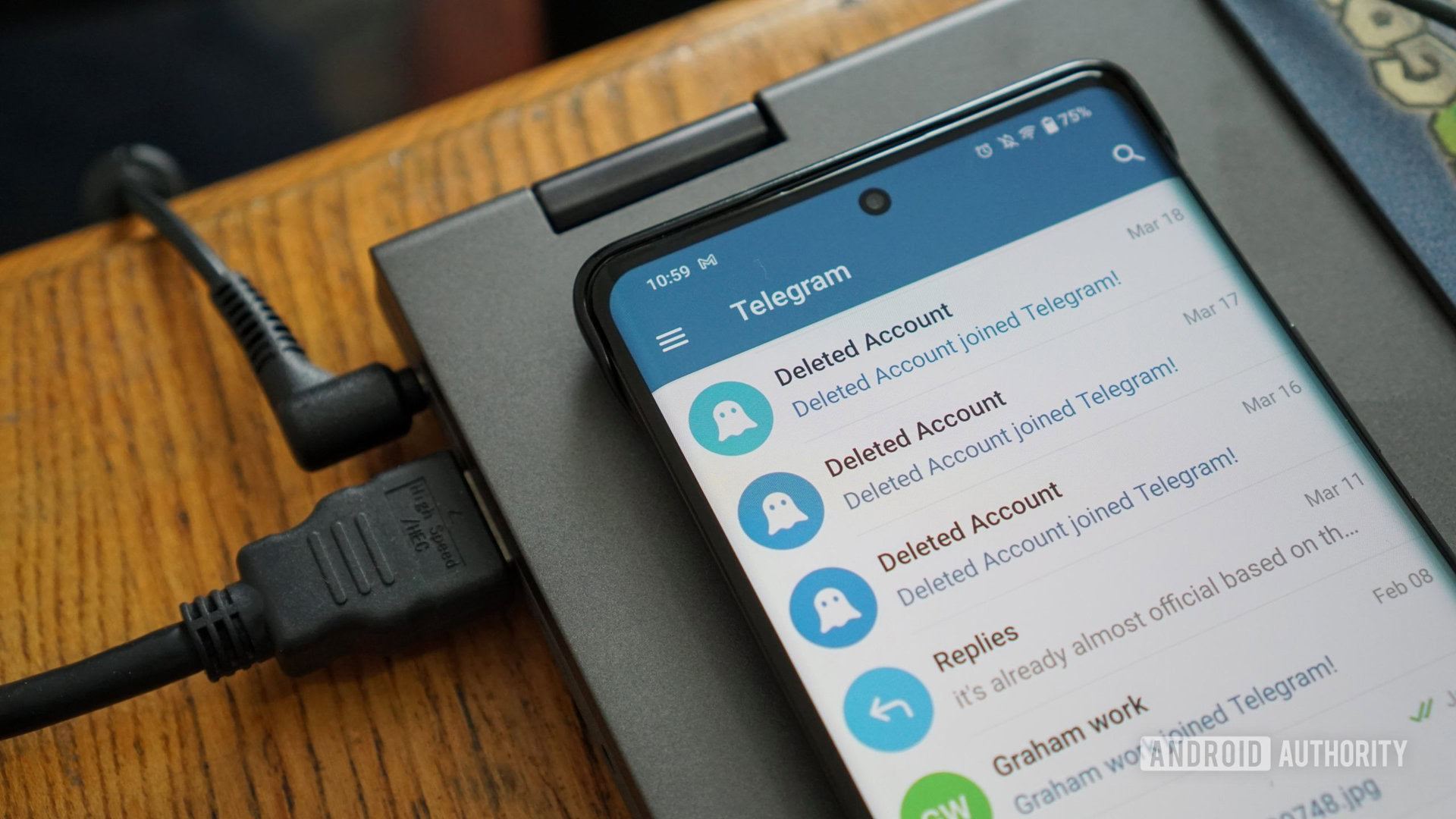Affiliate links on Android Authority may earn us a commission. Learn more.
Is Telegram safe?

Although Telegram is a niche messaging service in the US and Canada, it’s absolutely gigantic worldwide, with over 104 million users in India alone. If you’re new to the service, stats like that can be a little intimidating — but they shouldn’t be, at least not on their own. Here’s what you need to know about Telegram’s security, including how to stay safe day-to-day.
JUMP TO KEY SECTIONS
Is Telegram safe and secure?

Mostly, if we’re going to boil things down. All calls and chats are encrypted to some degree, and that escalates to end-to-end encryption for calls or Secret Chats between two people, effectively preventing interception in those situations — even by Telegram. You can also require that messages, photos, videos, and other files sent in Secret Chats “self-destruct” a fixed amount of time after they’ve been seen.
Group conversations (i.e. between three or more people) don’t enjoy end-to-end encryption or self-destruction features, but they’re nevertheless one of the app’s selling points. People regularly set up permanent groups as well as Channels, the latter of which can be used to broadcast messages to hundreds, thousands, or even millions of people.
Both groups and Channels pose some unique safety issues. They can be used to spread scams, porn, and misinformation, and they’ve been implicated as fueling violence or even genocide in places like India, Pakistan, and Myanmar. Telegram does have rules and algorithms to guard against these things, including promoting any kind of violence, but it doesn’t seem to be able to enforce them consistently. Ultimately, it’s up to end users to be skeptical about other people and the messages they spread, and report anything problematic.
For those reasons you should probably steer kids towards alternative platforms. If that’s impractical, you still can go to Settings > Privacy and Security in the app and toggle on options like group controls and Restricted Mode, the latter of which censors content like nudity and violence.
An option you should probably leave disabled is People Nearby. This lets you see other Telegram users in your area, but in the past it’s been demonstrated that a hacker could exploit this to find a person’s exact location. You can make sure your location is hidden by going to Contacts > Find People Nearby and choosing Stop Showing Me.
One last point is that while Telegram is sometimes labeled open-source, that only applies to the client software. On the server side, Telegram uses a proprietary protocol called MTProto for message encryption. As a rule, security experts prefer standardized encryption libraries where all of the potential vulnerabilities are known and being addressed.
Does Telegram collect data?
Yes. By necessity, the company stores data like your username, device info, usage habits, and connecting IP address. If applicable it also records other Telegram apps you’ve used, along with your history of username changes. This metadata is stored for up to 12 months, but it’s not used for advertising or other commercial purposes.
Be aware that law enforcement and spy agencies could potentially ask Telegram to turn over server-side data, or else directly target you by seizing your phone or launching phishing and surveillance attacks. These things are true with any online service, but real-world incidents have previously occurred involving Iranian dissidents.
How to stay safe on Telegram

Generally speaking, you should have no problems on Telegram as long as you follow these principles:
- Use two-step verification. You can find the option under Settings > Privacy and Security. This makes it much harder for someone to hijack your account.
- Limit the amount of information you share. Hide your phone number, and if people don’t need to know what you look like, you can use an artistic profile image instead or set separate public and private photos. In public conversations, resist the temptation to share details that could identify you, other accounts, or your specific location.
- Stick to one-on-one calls and Secret Chats whenever possible. Friends and family may often be in the same groups, but going private ensures both end-to-end encryption and fewer chances of accidentally sharing private info.
- Think skeptically about the groups and Channels you participate in. It’s easier than it should be to get swept up in a mob mentality, especially when friends or family are pressuring you to participate, or you’re being tempted with rewards. The popularity or fervor of a group doesn’t necessarily say anything about the truth of its beliefs — always demand logic and evidence, especially if money, sex, politics, religion, and/or violence are involved.
- Don’t exchange money or account details with people you don’t know personally. Scammers may try to impersonate tech support, a bank representative, or anyone else they can think of that holds a position of trust, but no one of that status is going to ask for money or account details out of the blue using Telegram. If there’s reason for doubt, check details like a person’s username and their available contact info. You might even call a known phone number and ask them to verify the conversation.
- Don’t get emotionally attached to people you haven’t met in person. Romance/catfishing scams are all-too common. These involve a scammer flirting with you long enough to build up the illusion of a “relationship,” but then suddenly manufacturing a crisis that demands money, such as a visa or missed rent. There are even worse threats too, such as sexual predators or human trafficking. If a relationship is genuine, the person won’t object to a real-world meeting in a public place you agree to. Consider bringing one or more friends for extra safety.
- Avoid tapping on links from strangers. If someone you don’t know urges you to tap on a web link, especially in the guise of something like tech support or a giveaway, it could easily be intended to infect your device with malware or spyware, or trick you into sharing private info through a fake (a.k.a. “phishing”) website.
- If it’s too good to be true, it probably is. You’re not going to luck into lottery wins, the love of your life, luxury discounts, or once-in-a-lifetime investment opportunities through random encounters on Telegram. Stay skeptical at all times when dealing with new people.
FAQs
No. The company’s founders, Pavel and Nikolai Durov, are originally from Russia, but they ultimately fled the country and divested themselves of VKontakte, a popular social network there. At the moment Telegram is legally based in the British Virgin Islands, but functionally headquartered in Dubai.
If you know and fully trust the other person, yes. Secret Chats offer end-to-end encryption as well as the option of “self-destructing” photos and videos. Be mindful that a person could still use screenshots or screen recordings to save things you don’t want shared.
You can operate pretty anonymously if you want to. You no longer have to use a phone number to sign up, and you can easily hide details like your real face. One-on-one calls and Secret Chats provide end-to-end encryption, making them impenetrable to Telegram, let alone outside parties.
The company has been a target of hackers in the past, but generally speaking it should be okay. For maximum security, there are now alternatives to your phone number when creating an account.